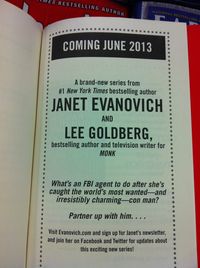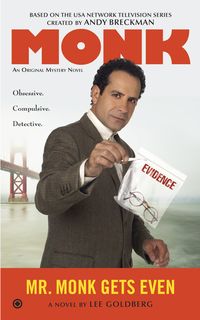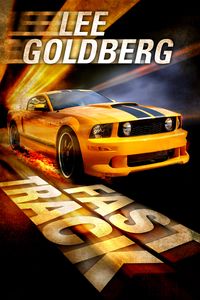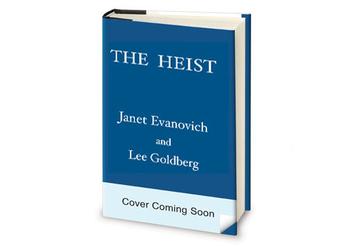A Peek at The Heist
From the Janet Evanovich newsletter:
Busy Bee Lee
 I've been so busy, I haven't been able to honor my New Year's resolution to post more often to the blog. But I'm sure you'll understand.
I've been so busy, I haven't been able to honor my New Year's resolution to post more often to the blog. But I'm sure you'll understand.
Last week I was in Florida, indulging my inner Fabio, doing a photo shoot with Janet Evanovich for our adventure novel THE HEIST, the first in our new series, which comes out June 18th.
Janet and I had a terrific time together, almost as much fun as we had writing the book, and I think that's going to come through in our author photos. But there was no rest for either one of us. We're already deep into writing the second book in the series and having a blast!
(Photo: Advertisement in hardcover edition of Janet's novel Notorious Nineteen)
The Mail I Get – Mr. Monk Edition
 I have been flooded with emails from readers of MR. MONK GETS EVEN, my 15th and final MONK book. The reaction has been so heartfelt, and so positive, that it almost makes me feel guilty for walking away from the series…though I know it's in very good hands now with my friend Hy Conrad picking up where I left off.
I have been flooded with emails from readers of MR. MONK GETS EVEN, my 15th and final MONK book. The reaction has been so heartfelt, and so positive, that it almost makes me feel guilty for walking away from the series…though I know it's in very good hands now with my friend Hy Conrad picking up where I left off.
Here's just a sampling of some of the many, many emails I've received and the very nice things readers have been saying:
I’m about to start reading your last Monk novel, and I’m going to read very slowly because I don’t want it to be over. Thank you for giving me so much reading enjoyment, including many laugh-out-loud moments.– Jan Roan
Why do all good things have to come to an end? Your Monk series is absolutely delightful. I got excited every time a new book came out. Thank you for what you've given to die hard Monk fans. It really meant alot. – Classiceman
ANOTHER BRILLIANT book!!!! And was so sad and shocked to read that this is your last Monk book. It was like a Monk Major Life event when I read that news. Anyway, thank-you for the many many years of great enjoyable reading. –Steve H. Karsten
As I read the last few MONK books, I realized you might be finishing the series. I am so disappointed! The enjoyment of visiting all the MONK characters is a treat, your style is easy to read, and a perfect way to relax. The humor is amazing, and I suppose I will now be reduced to re-reading these novels again and again. — Amy Tomlin
Thanks for all of the Monk books. I wasn't ready to say goodbye to Mr. Monk when the show ended! Loved the way you wrapped it all up. –Joelle Peterson
Thank you for 15 great Monk novels and innumerable hours of enjoyment. I am sorry to read number fifteen will be your last. Other than having great characters and a great mystery, the books were an outlet for me in my struggle against depression. Seriously. Whether I couldn't concentrate long enough or hold interest in other writers, I never missed a Monk book. Humor, mystery, and clean, I will miss them. Time to start the rereads, I guess. God's blessings to you, Mr. Goldberg. Not meaning to be maudlin, but you provided some light, enjoyable moments for me during dark times. Thank you–Jeff
I started Mr. Monk Gets Even yesterday and finished reading it today. Well done. It feels as if at the age of '56' I am laying down a down a good friend who I am going to miss. I periodically will continue to go back and read "Monk" and listen to all the audiobooks I have of each one, probably as long as I live. I fully understand your reasoning and 'why', but I just wanted to tell you that your writings will be GREATLY missed. I would be remiss if I had failed to let you know. . Thank you again for your contributions not only to the writing field, but also for the hours of enjoyment you have brought to this life. — Greg Souder
Hey Lee, just finished your final book sharing Monk's and Natalie's adventures. Thanks for an amazing ride – you'll definitely be missed!— Debbie Laskey
Just finished Mr. Monk Gets Even – an awesome ending to a fantastic series! Sad it's over but couldn't put it down. – J. Wilson
Thank you for writing the Monk books! I had never before gotten into a series of books that were based on a tv show. Once I picked up the first one though, I was hooked! I enjoy the books every bit as much as the show, if not more! — Celest Elmer
I really enjoyed your books and one of the things I liked best about your writing is that you've given Natalie a snarkiness that was just somewhat implied in the TV show. I like snarky Natalie […] I read that you are 'retiring' from the novel series but I thought I'd just write and express my appreciation for the fine work you've done with the Mr Monk novels.–Danny Chen
There are fun benefits to having seen all the Monk episodes and reading all the Monk books. I just read Mr. Monk Gets Even and really enjoyed the references to past works and shows. And the nod to Diagnosis Murder! Thanks, Lee, for the great journey with you and Mr. Monk!!— Ruth Fisher StoddardHaven't been this excited since Deathly Hallows. Thanks for an awesome run Lee. I sure do love this series. — Kelly Choma
I finished Mr. Monk Gets Even today… it was absolutely lovely!! I've thoroughly enjoyed each one in your series – and this one absolutely glows! I appreciate how the characters have continued to grow throughout the series, including Mr. Monk – whether he likes it or not. You've taken such incredibly good care of each one of them. And though I wouldn't have believed I would, I even enjoy the new regular characters. It all just works beautifully! Honestly, before this, I've always scoffed at the idea of book series based on TV shows, but Mr. Monk's absence from TV drove me to give them a chance. Well – you've completely won me over! I've become as big a fan of the Mr. Monk books, as I am the show. Thanks for such a wonderful series – and for keeping Mr. Monk going strong!! – Heather Sikora James
Writing on the Fast Track
 I've had so much commercial and critical success with my ebook McGRAVE, which was based on an unproduced pilot I wrote for Sony International Television, that I've decided to write novelizations of all of my pilot and TV movie scripts, produced and unproduced, on which I retained the publishing rights.
I've had so much commercial and critical success with my ebook McGRAVE, which was based on an unproduced pilot I wrote for Sony International Television, that I've decided to write novelizations of all of my pilot and TV movie scripts, produced and unproduced, on which I retained the publishing rights.
So during a brief hiatus between books in 2012, I novelized my first draft screenplay for FAST TRACK, the action movie I wrote and produced for Action Concept and ProSeiben in Berlin a few years ago.
FAST TRACK was a two-hour pilot for an American-style action series that would have been shot in English and German with a cast of American, Canadian, British, French and German actors and followed the lives of four young people in the world of illegal street racing. ProSeiben commissioned the pilot movie and scripts for six episodes. Making the movie, which was directed by Axel Sand and starred Erin Cahill, Andrew Walker, Alexia Barlier and Joseph Beattie, was one of the highlights of my career and the friendships I made during the production continue to this day. It was a fantastic experience professionally, creatively and personally (if you watch the "Making of Fast Track" documentary, I think you'll see why). Unfortunately, the series didn't happen…but perhaps because I've remained close to many of the actors, the characters have stayed fresh in my mind. I haven't been able to let go of them, and have tried to resurrect the project several times over the years (we came close with Cartoon Network, but it fell through).
So I approached the opportunty to revisit the FAST TRACK world with enthusiasm. I used the first draft screenplay as the basis for the book because it had some action elements that we either had to omit or re-imagine due to budget/scheduling/location issues and a prologue that was shot, but that I ultimately cut, in the final edit (I've always regretted cutting the prologue).
The film took place in Berlin, but I decided the novella would work better in the United States, so that required some rethinking of the characters' backstories and reworking some of the scenes. I also did a complete update on the cars, with the help of Sam Barer, the same technical consultant we used on the movie.

I had so much fun writing the FAST TRACK novella that if it does well, I may revisit the characters in sequels based on the twelve episode ideas that I came up with during the development of the pilot (though the stories,which I haven't looked at in years, may have been so Berlin/Europe-centered that they may not work in the new, Los Angeles setting).
But this experience has definitely spurred me on to take a look at my other scripts. I don't know yet which one I will tackle during my next short hiatus.
If you'd like to know more about FAST TRACK, here are some links:
The Making of Fast Track documentary
My Blogs About the Production, Post-Production and Promotion of Fast Track
Love is Murder
 I spent last weekend as a special guest at the Love is Murder conference in chilly Chicago and I had a terrific time.
I spent last weekend as a special guest at the Love is Murder conference in chilly Chicago and I had a terrific time.
It's probably the smallest mystery conference I've ever been too and, reflecting the huge popularity of self-publishing, there seemed to be more authors than readers in attendance. In fact, there were two big "group" signings over the weekend and there were so many "authors" sitting behind tables that there were maybe three actual "readers" left standing to buy books. I've signed more books at funerals.
But the small number of attendees also made the conference more intimate, and I had a lot of opportunities to talk shop with authors like William Kent Krueger, Bob Mayer, Blake Crouch, Joe Konrath, Ann Voss Petersen, F. Paul Wilson, Robert Goldsborough, Jamie Freveletti, Libby Fischer Hellmann, Sparkle Abbey, Hannah Dennison and Raymond Benson, to name just a few (that's me with Kent and Libby in the picture). We spent a lot of time trying to figure out where the publishing business is going, though we didn't manage to come up with the answer. But we agreed that it's a great time to be an author.
I was treated by Joe Konrath to the worst hamburger I've ever had in my life. It was from White Castle. Joe, his wife, and F. Paul Walker went wild over those burgers. I sent mine to a forensic lab for analysis and am awaiting the results. I'm curious to know what that very thin, oddly-colored patty was actually made of. When Joe comes to Los Angeles, I'm going to take him to In-and-Out or The Habit so he can see what a real hamburger tastes like.
I was a guest on many lively and fun panels, including one on writing characters created by others. My fellow panelists were Robert Goldsborough, who talked about picking up Nero Wolfe where Rex Stout left off, and two strange women who wore matching shirts covered with their bookcovers and talked about revising an unfinished manuscript written by a dead guy…with help from his ghost. I kid you not.
One of the women said her first novel came to her in a dream. She encountered Bugs Bunny on a spirit path, he opened his skull, and there was her book, cover and all, inside his head. She read the book, woke up, then ran downstairs to make notes and describe the cover. She then fleshed the story out with the help of her friend's dead father's ghost. Or something like that. Their process was so confusing, and there were so many ghosts and cartoon characters involved in their writing, that it was hard to follow. They also read aloud from their book, which was a real treat.
On Sunday, Libby took me on a tour of Chicago, and one of our stops was the Sears Tower,
 where I discovered that I have a slight fear of heights…it revealed itself to me when I stepped out on the "skydeck" that is basically a piece of plastic hanging out over the street where a normal window is supposed to be. I couldn't help thinking I'd be the one who finally fell through…and for what? A photograph. Libby was very amused by my discomfort.
where I discovered that I have a slight fear of heights…it revealed itself to me when I stepped out on the "skydeck" that is basically a piece of plastic hanging out over the street where a normal window is supposed to be. I couldn't help thinking I'd be the one who finally fell through…and for what? A photograph. Libby was very amused by my discomfort.
Afterwards, we met with Jamie Freveletti for some deep dish pizza and shop talk, which I really enjoyed. I realized that one of the things I miss most about being on a TV show is all the time spent in the writers room, working with other writers. Now that I'm primarily a novelist, my writer's room is me and my dog, who doesn't contribute much when it comes to breaking stories.
I flew home on Monday. On the plane, a young woman fell asleep and snuggled up against me. That's not the first time that's happened. I must have a very comfy shoulder. After about an hour, I moved a bit and woke her up. She was startled an mortified, not so much because she discovered that she was clutching me, but because the first thing she saw was a graphic, brutal sex scene from Game of Thrones on my iPad. If the plane wasn't full, I think she would have switched seats.
All in all, a very pleasant trip. Next week, I am off to Florida for a photo shoot for The Heist, the book I wrote with Janet Evanovich.





